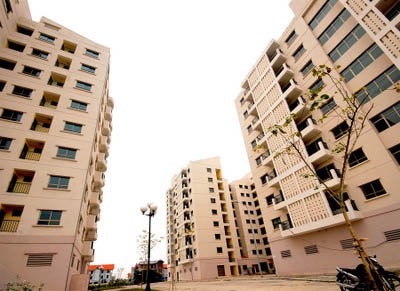Developers in dire need of long-term loans
At a seminar in Ho Chi Minh City on September 21, William Ross, a representative of the Hong Kong and Shanghai Banking Corporation (HSBC), said that the property market plays a very important role in the Vietnamese economy. Once this market picks up, it will prompt other economic sectors to develop. However, Vietnamese property developers are facing capital shortages.
 The fact is that most investors are thirsty for capital and it’s all they can do to scramble to get a license for just one project. To have the project get off the ground, they have to offer incentives to lure partners. But it’s not easy to find partners when the property market is frozen. This is the reason the property market is developing unsteadily in Vietnam.
The fact is that most investors are thirsty for capital and it’s all they can do to scramble to get a license for just one project. To have the project get off the ground, they have to offer incentives to lure partners. But it’s not easy to find partners when the property market is frozen. This is the reason the property market is developing unsteadily in Vietnam. Commercial banks are considered the main channel investors can rely on to mobilise capital for their projects. However, these banks offer only short-term loans that do not really satisfy developers. Developers are constantly under pressure to pay back loans. This is completely at odds with the bustling property markets in the US and the UK where investment funds and financial institutions offer loans over 20 or even 30 years, provided projects prove to be efficient.
According to economic expert K.P. Sing from Colliers International, there are positive signs that the Vietnamese economy has overcome the most difficult period. Notably, the banking and financial sector has maintained stable interest rates – a sign that it has weathered the global financial storm.
However, to help the property market develop in a sustainable manner, he suggested that Vietnam further improve policy, speed up administrative reforms, and more importantly, seek channels that can offer long-term loans.
Time now for domestic businesses
It’s worth mentioning that two or three years ago, foreign organisations were encouraged to invest in infrastructure development projects in Vietnam. Investments poured into the real estate market until the global economic recession began, forcing many foreign investors to withdraw and hand off projects to domestic companies.
Le Chi Hieu, general director of Thu Duc Housing Development Company, said despite difficulties, businesses know how to mobilise capital from other sources, including their equity, the sale of company bonds, customers and joint ventures. Thu Duc Housing has signed contracts with domestic companies and even set up a real estate company in the US to take advantage of the financial crisis.
However, he suggested that policies on the property transfer market be adjusted soon to comply with international norms. Taking the issuance of company bonds as an example, he said it is a new concept in Vietnam which has no complete legal framework yet.
In the face of difficulties, domestic businesses have teamed up to revitalise the market and build up buyers’ trust. On September 19, Tinnghia Land, Donaland and Sonadezi - three big real estate trading floors in the southern province of Dong Nai – signed a cooperation agreement to develop the property market in the province.
Nguyen Thi Thanh Huong, director of the Tin Nghia Land trading floor, said by working together, trading floors can support each other in training brokers and assessing property.
Phan Huu Thang, head of the Foreign Investment Agency, said it’s time domestic real estate developers showed their strength. However, he suggested that Vietnamese businesses work with foreign partners, especially in urban planning, construction and architectural design.
Tin mới hơn:
- Anticipating recovery, private capital flows to Vietnam
- Capital city plans to become major metropolis
- FDI in real estate, not an unmixed blessing: analysts
- Seven-star Plaza Complex to open in early 2010
- Real estate, building materials looking good for investors
Tin cũ hơn:
- Hanoi decides to preserve French-style villas
- Consultant hired for Hanoi elevated railway
- Young architects saving the best of old Hanoi
- HCM City to host two exhibitions on construction industry
- HCMC to become metropolis by 2020: draft report




























